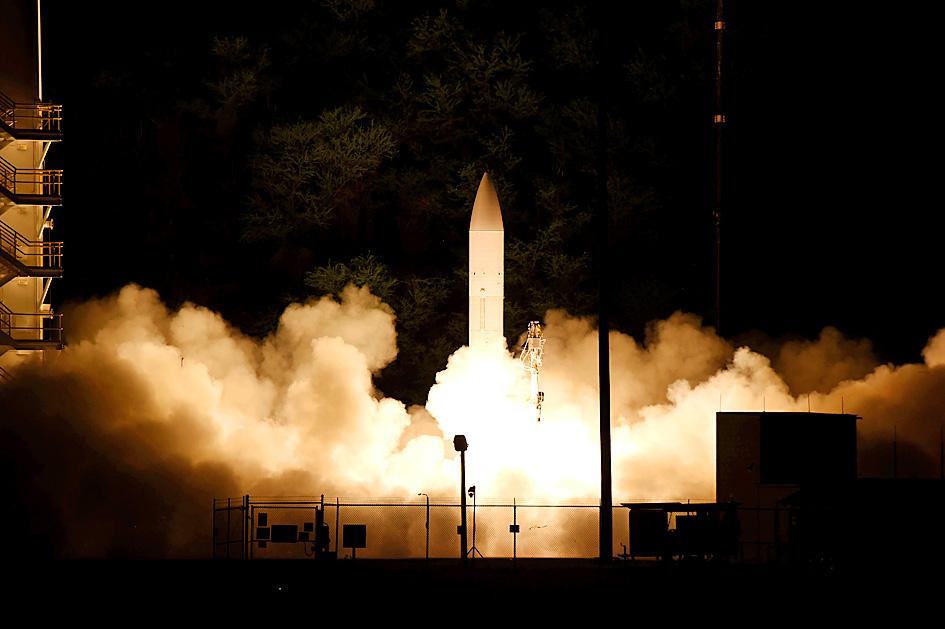A flight test of a hypersonic missile system in Hawaii on Wednesday ended in failure due to a problem that occurred after ignition, the US Department of Defense said, delivering a fresh blow to a program that has experienced stumbles.
It did not provide details of what took place in the test, but said in an e-mailed statement that “the department remains confident that it is on track to field offensive and defensive hypersonic capabilities on target dates beginning in the early 2020s.”
“An anomaly occurred following ignition of the test asset,” Pentagon spokesman US Navy Lieutenant Commander Tim Gorman said in the statement.

Photo: AFP / US Navy / Oscar Sosa
“Program officials have initiated a review to determine the cause to inform future tests.” he said. “While the department was unable to collect data on the entirety of the planned flight profile, the information gathered from this event will provide vital insights.”
The trial marked the second unsuccessful test flight of the prototype weapon known as Conventional Prompt Strike.
There was a booster failure in its first flight test in October last year, which prevented the missile from leaving the launch pad. The weapon is envisioned to be installed on Zumwalt-class destroyers and Virginia-class submarines.
The US Army is developing a land-based version. Lockheed Martin and Northrop Grumman are the top contractors.
The Pentagon is feeling pressure to deploy hypersonic systems as rivals including Russia, China and North Korea are pressing ahead with the systems designed to evade interception by flying at more than five times the speed of sound and gliding on a maneuverable path to deliver nuclear warheads.
China is investing heavily in hypersonic weapons, putting one in orbit in July last year that flew 40,000km in more than 100 minutes of flight, the US military said.
In January, North Korea conducted two separate launches of hypersonic missile systems that traveled several hundred kilometers.
Russia debuted a hypersonic air-to-ground missile in its attack on Ukraine.
Adversaries do not have to meet the rigorous standards set under the US defense acquisition system or face public scrutiny over delays and failure.
The slower pace of US hypersonic programs prompted a number of heated exchanges when US Secretary of Defense Lloyd Austin testified in April before the US House of Representatives Armed Services Committee.
“You recently called in the defense industrial community that were involved in the hypersonics development as to how we can speed that up,” US Representative Mike Turner said. “We’re behind our adversaries.”
Without denying that, Austin said that “we have to be careful” because “hypersonic is a capability, sir, but it’s not the only capability.”
“I have engaged industry” to “make sure that they’re leaning into” hypersonic development, he added.

‘IN A DIFFERENT PLACE’: The envoy first visited Shanghai, where he attended a Chinese basketball playoff match, and is to meet top officials in Beijing tomorrow US Secretary of State Antony Blinken yesterday arrived in China on his second visit in a year as the US ramps up pressure on its rival over its support for Russia while also seeking to manage tensions with Beijing. The US diplomat tomorrow is to meet China’s top brass in Beijing, where he is also expected to plead for restraint as Taiwan inaugurates president-elect William Lai (賴清德), and to raise US concerns on Chinese trade practices. However, Blinken is also seeking to stabilize ties, with tensions between the world’s two largest economies easing since his previous visit in June last year. At the
Nearly half of China’s major cities are suffering “moderate to severe” levels of subsidence, putting millions of people at risk of flooding, especially as sea levels rise, according to a study of nationwide satellite data released yesterday. The authors of the paper, published by the journal Science, found that 45 percent of China’s urban land was sinking faster than 3mm per year, with 16 percent at more than 10mm per year, driven not only by declining water tables, but also the sheer weight of the built environment. With China’s urban population already in excess of 900 million people, “even a small portion

UNSETTLING IMAGES: The scene took place in front of TV crews covering the Trump trial, with a CNN anchor calling it an ‘emotional and unbelievably disturbing moment’ A man who doused himself in an accelerant and set himself on fire outside the courthouse where former US president Donald Trump is on trial has died, police said yesterday. The New York City Police Department (NYPD) said the man was declared dead by staff at an area hospital. The man was in Collect Pond Park at about 1:30pm on Friday when he took out pamphlets espousing conspiracy theories, tossed them around, then doused himself in an accelerant and set himself on fire, officials and witnesses said. A large number of police officers were nearby when it happened. Some officers and bystanders rushed

Beijing is continuing to commit genocide and crimes against humanity against Uyghurs and other Muslim minorities in its western Xinjiang province, U.S. Secretary of State Antony Blinken said in a report published on Monday, ahead of his planned visit to China this week. The State Department’s annual human rights report, which documents abuses recorded all over the world during the previous calendar year, repeated language from previous years on the treatment of Muslims in Xinjiang, but the publication raises the issue ahead of delicate talks, including on the war in Ukraine and global trade, between the top U.S. diplomat and Chinese